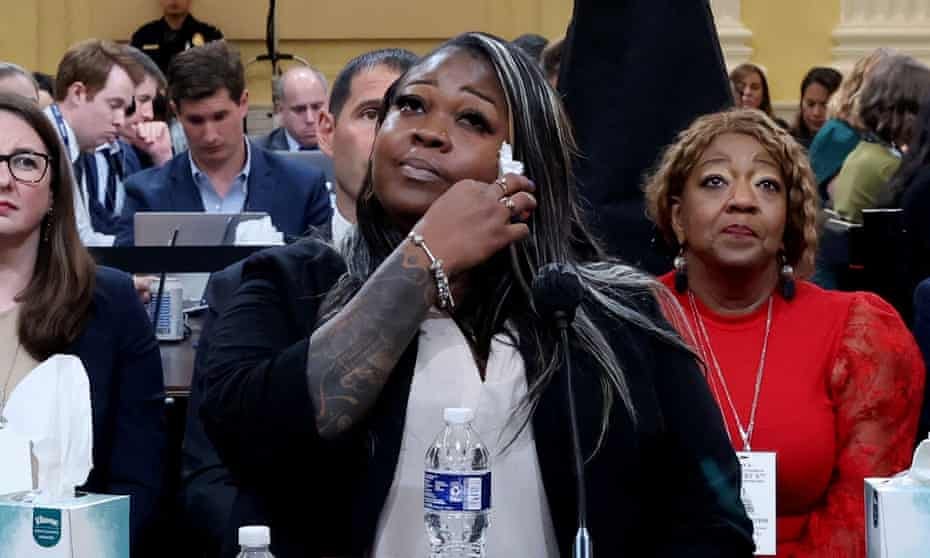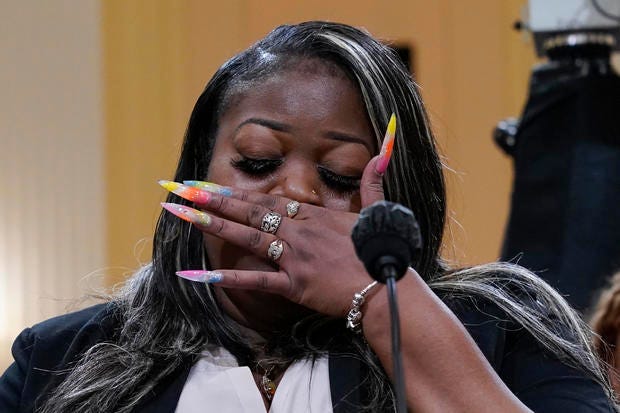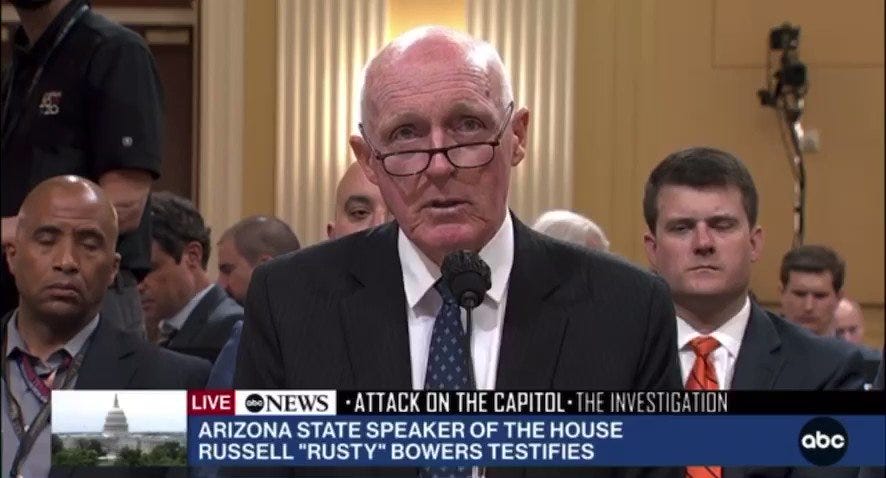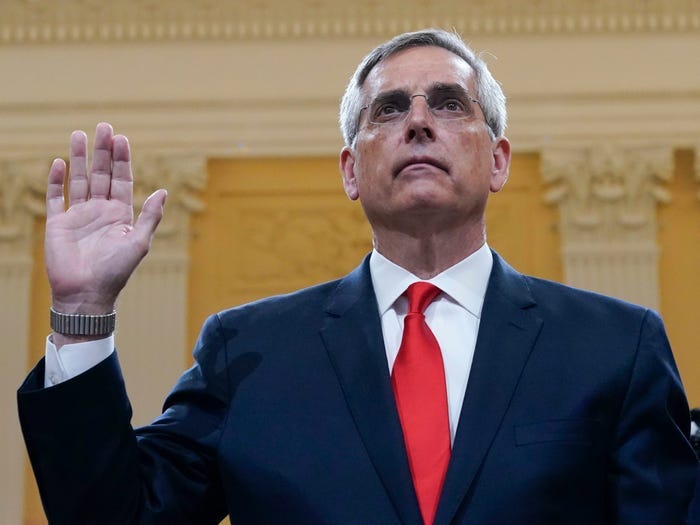A Close-up Look at a Despicable Trump—Day Four
Ruining Lives with His “State Pressure” Campaign
In the summer of 1973, the star witness before the Senate Watergate Committee was former White House Counsel John Dean, who testified that he told President Nixon, “There’s a cancer growing on the presidency.”
At the end of Day Four of the historic January 6th Committee hearings, Rep. Liz Cheney (R-WY) —hoping for a star witness—made a point of asking Donald Trump’s White House Counsel, Pat Cipollone, to testify. Cipollone objected to the coup plot, but I doubt he’ll cooperate. He’s tight with Laura Ingraham, who thinks the hearings “bombed.” Besides, this time, the cancer is the former president himself, and it’s still growing on the country.
On Tuesday, we got a close-up look at a genuinely evil man, a despicable character who thinks nothing of using the power of his office to lie about ordinary people and threaten their lives. I won’t soon forget what “Lady Ruby” and her family went through.
At this point, it’s obvious that the assault on the Capitol was not merely a peaceful protest that got “out of control” (as Trump claimed again this week); it was the result of Trump’s clear incitement and gross dereliction of duty and part of a specific plot to overturn the election by pressuring Mike Pence to trample on the Constitution. It was also the culmination of a weeks-long “state pressure campaign” of intimidation and not-so-veiled threats of violence by Trump, his henchmen and fascistic followers that served as a “dangerous precursor” to January 6th.
Beyond basic accountability, Cheney summed up the broader stakes: “We cannot let America become a nation of conspiracy theories and thug violence.”
Chair Bennie Thompson (D-MS) opened the hearing by pointing out that, as former federal judge Michael Luttig put it last week, Big Lie Republicans remain a “clear and present danger” to the republic. He cited the current case of Republican election commissioners in New Mexico who, before a court order, refused to certify the results of an election this month, citing debunked claims about Dominion voting machines. Thompson said that without real change, the next time, “We won’t have close calls—we’ll have a catastrophe.” Making his first appearance in the televised hearings, Adam Schiff added: “The system held, but barely.”
Schiff reminded me of something I’d forgotten—that the plot to overturn the results actually began on Election Night when Trump urged states that might go for Joe Biden to stop counting votes. (As he had been told, heavily-Democratic mail-in ballots are generally counted last). “When he couldn’t stop the counting, he went to court,” Schiff said. “When that failed, he mounted a pressure campaign to get state legislatures to go back into session and send two slates of electors” to the meetings of the Electoral College. When no state legislators would do that, he began threatening state officials with retribution.
The backdrop to those threats is that by the time of the state pressure campaign, Trump already knew that he was peddling what his attorney general, William Barr, had told him was “bullshit.” More specifically, Barr testified that he told Trump that “the Fulton County allegations had no merit.” This included the phony story about a water main break and “suitcases of 18,000 votes” being taken from under the table. Deputy Attorney General Donoghue told him the same: “Sir, the major allegations are not supported by the evidence.”
The first witness was a new face: Rusty Bowers, the Republican speaker of the Arizona House of Representatives. Notwithstanding Trump’s predictable efforts to discredit him just before the hearing, Bowers—who voted for Trump— came off as entirely credible. Recalling Arizona’s ridiculous “fraudit” conducted for months by Cyber Ninjas, I tried to imagine what would have happened if any prominent Republican other than Bowers had been speaker. Arizona might well have submitted fake electors with the imprimatur of the state legislature instead of merely the state party. Big difference.
Bowers recalled sitting in his car in the driveway talking on the phone to Trump and Rudy Giuliani, who told him that 200,000 illegal immigrants had voted. Besides the racism of the charge (and the implausibility, considering that undocumented people are generally fearful of being deported and almost never try to vote), there was absolutely zero evidence for it. Nor for their charge that 5,000-6,000 dead people had voted in Arizona.
When Bowers asked Giuliani for the names of these phantom voters, Trump said: “Give the man what he needs, Rudy.” Which—despite claiming to have researched obituaries— he never did, of course. Bowers refused to give the Big Liars an official hearing for their “circus” at the state Capitol: “You’re asking me to do something that is contrary to my oath.” He noted that Rudy made rank partisan appeals: He “would say, ‘Aren’t we all Republicans here?’” And then there was Giuliani’s Freudian slip that, “We’ve got lots of theories, we just don’t have the evidence.” That may be the only true thing to come out of Rudy’s mouth since 9/11.
John Eastman, the lawyer Trump is now apparently throwing under the bus, advised Bowers to use his “plenary authority” to give Arizona to Trump: “Just do it and let the courts sort it out,” he told him. Given that Eastman was so worried about his legal jeopardy that he (unsuccessfully) sought a Trump pardon and took the Fifth before the committee, some hopeful visions danced in my head. Is it possible that Republican state lawmakers tempted in 2024 to submit fake electors might be sobered by Giuliani and Eastman’s coming legal travails?
We learned some new details about the Trump fake electors scheme, which RNC Chair Ronna McDaniel linked directly to Trump. It was one thing to assemble alternative slates while Trump’s legal challenges worked their way through the courts. If Trump won in court, the slates would have been ready to be activated. But once all 62 appeals had been exhausted and the election in contested states had been certified, those electors weren’t just fake, they were illegal, as all three of the Trump campaign lawyers advised. The coup plotters knew this, which is why they instructed the state electors to meet in secret. In Michigan, for instance, they were told to “hide overnight” in the state Capitol building.
Bowers kept a diary, which should be a useful exhibit in a trial. He wrote that amid “the wilderness of life” he refused to be a “coward.” His principled bottom line: “I do not want to be a winner by cheating.” But there was a price. After standing up to Trump, he received nearly 20,000 emails, many of them calling him a pedophile, and protesters blared hate at his house through loudspeakers. Bowers testified that his gravely ill daughter “was upset by what was happening outside.” Weeks later, she died.
Having listened to all 67 minutes of Trump’s infamous call to Georgia Secretary of State Brad Raffensperger, I wasn’t expecting to learn much from Raffensperger’s live testimony. I was wrong. There’s more to the story than Trump’s smoking soundbite: “I just want to find 11,780 votes, which is one more than we have.”
Faced with Trump’s preposterous boast that he won Georgia by at least 400,000 votes, Raffensperger’s office chased down more than 300 leads. Trump claimed 5,000 “dead people voted” (later raised in a Trump lawsuit to 10,215). Raffensperger noted tartly in his testimony that his office “found a total of 4, not 10,000, not 5,000.” He went on: "They said that there was 2,423 nonregistered voters. There were zero. They said that there was 2,056 felons. We identified 74 or less that were actually still on a felony sentence.” Underage voters? None at all. It turns out that 28,000 Georgians skipped the presidential race and only voted down ballot—“and that’s why President Trump came up short.”
Raffensperger explained (not for the first time) how Biden’s 12,000-vote win was confirmed by a full hand recount and two more machine recounts, each time with results “remarkably close” to the original count. I had forgotten how early it was that voting system supervisor Gabriel Sterling (who also testified live) warned that if the harassment of election workers didn’t stop, “someone’s gonna get killed.” That passionate news conference took place on December 1, 2020. For weeks after he was warned, Trump continued to put the lives of election officials who displeased him in danger.
Sterling reflected on the futility of trying to establish the truth in the face of Trump’s tweets and speeches. “It was like a shovel trying to empty the ocean,” he said. One lawyer told him: “I just knew in my heart they [Democrats] cheated.” Others had more respect for truth. After Trump forced the U.S. attorney, Bjay Pak, to resign because he wouldn’t go along with the Big Lie, his replacement, Bobby Christine, also reviewed the infamous tape from Atlanta’s State Farm Arena (where Fulton County votes were being counted). He, too, concluded there was nothing amiss—that what Giuliani called a “smoking gun” video was just part of what Raffensperger called “normal ballot processing.” This was echoed in Washington, where the deputy attorney general, Richard Donoghue, was only one of many who told the president: “No sir, there is no suitcase.”
Trump sent his chief of staff, Mark Meadows, to Georgia to pressure investigators, and Meadows offered them “a shitload of MAGA stuff”—a merch bribe that one hopes will cause Meadows legal trouble down the road. The president also phoned Raffensperger’s chief investigator, Frances Watson, and told her, “When the right answer comes out, you’ll be praised.” This is like the Godfather saying, “I’ll make him an offer he can’t refuse.” The implication, of course, was that if the “wrong answer comes out,” she will be damned—or worse.
“Worse” would be the president ordering up the prosecution of those who tried to prevent him from overturning the election. This is what Trump threatened in his infamous call to Raffensperger. Among Trump’s threats:
“It’s more illegal for you than it is for them.”
“That’s a big risk for you.”
“When you talk about no criminality, that’s very dangerous for you to say that.”
Raffensperger interpreted these statements as threats and they will likely be seen as such by grand juries in Atlanta and Washington.
The harassment of Raffensperger and his family was shameful. He was doxxed and his wife, whom he had been with since high school, was sent “sexualized” material. Rightwing thugs broke into the home of their daughter-in-law, who—after their son died—lived there alone with her two kids. Besides Raffensperger and Bowers, Michigan Senate Majority Leader Mike Shirkey (R), Pennsylvania House Speaker Bryan Cutler (R) and Michigan Secretary of State Jocelyn Benson (D) also reported being harassed and/or pressured.
At least these politicians had some idea of the price of entering public life. The same cannot be said of the final and most wrenching witness of the day, Shaye Freeman Moss. She and her mother, Ruby Freeman, (sitting behind her), were election workers at the State Farm Arena.

Shaye Moss spoke of how she had found her job “exciting,” especially helping elderly and disabled voters. “What I loved most were the older voters” because older people in my family hadn’t been allowed to vote,” she said.
But then she learned to her horror that Rudy Giuliani had—with zero evidence— accused her of stealing thousands of votes. In a shockingly racist twist, Giuliani said that in executing their scheme Shaye and her mother had “passed around USB drives like vials of heroin or cocaine.”
The “USB drives” were actually ginger mints.
Moss describes going to the Messenger icon on her phone and finding people ”wishing death upon me” and leaving messages like, “Be glad it’s 2020 and not 1920.” Moss said she gained 60 pounds, feared going out, and worried over her grandmother being hassled at her doorstep, where at night she was sent pizzas she had never ordered. “I felt like it was my fault for putting my family in this situation,” she testified.
Her mother’s testimony (in a taped deposition) was equally moving. Ruby Freeman recounted that she was known as “Lady Ruby” and wore a tee-shirt with her nickname emblazoned on it when counting votes—a shirt she has never worn again. “I’ve lost my name, and I’ve lost my reputation. I’ve lost my sense of security, all because a group of people, starting with number ‘45’ and his ally, Rudy Giuliani, decided to scapegoat me and my daughter, Shaye, to push their own lies about how the presidential election was stolen.” The FBI told her she had to leave home for her own safety, and she couldn’t return for two months—until after the Biden inauguration. Not surprisingly, Ruby, Shaye and other election workers from her immediate area have left their jobs.
“Do you know how it feels to have the President of the United States target you?” Ruby Freeman asked.
It’s a question all Americans should ask themselves as we struggle to emerge from our long national nightmare.
I posted an extensive recap of Day One, Day Two and Day Three. I welcome your comments below on my take and on the broader story.









Ever since Trump was elected in 2016, it has always felt surreal. There is a darkness in Trump that I have always seen clearly, and I have never stopped wondering why others couldn't see it. Trump is evil and as long as he lives, he will always be a threat to the entire world.
I was horrified by what these witnesses said yesterday, and by what Trump has done to these innocent people for doing their jobs. We're being shown what Trump is capable of, and I suspect there are no limits to what he would do in the future. I hope he will not be allowed to run for president again and will end up in prison for his crimes.
Alter is a reporter/writer with great patience in covering the WHOLE story for his readers. Thanks!